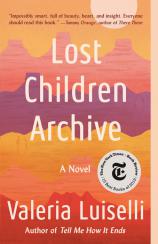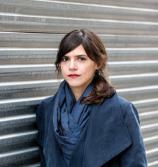Excerpt
Excerpt
Lost Children Archive

Part I: Family Soundscape
Relocations
“An archive presupposes an archivist, a hand that
collects and classifies.”
—Arlette Farge
“To leave is to die a little.
To arrive is never to arrive.”
—Migrant prayer
Departure
Mouths open to the sun, they sleep. Boy and girl, foreheads pearled with sweat, cheeks red and streaked white with dry spit. They occupy the entire space in the back of the car, spread out, limbs offering, heavy and placid. From the copilot seat, I glance back to check on them every so often, then turn around to study the map again. We advance in the slow lava of traffic toward the city limits, across the GW Bridge, and merge onto the interstate. An airplane passes above us and leaves a straight long scar on the palate of the cloudless sky. Behind the wheel, my husband adjusts his hat, dries his forehead with the back of his hand.
Family Lexicon
I don’t know what my husband and I will say to each of our children one day. I’m not sure which parts of our story we might each choose to pluck and edit out for them, and which ones we’d shuffle around and insert back in to produce a final version—even though plucking, shuffling, and editing sounds is probably the best summary of what my husband and I do for a living. But the children will ask, because ask is what children do. And we’ll need to tell them a beginning, a middle, and an end. We’ll need to give them an answer, tell them a proper story.
The boy turned ten yesterday, just one day before we left New York. We got him good presents. He had specifically said:
No toys.
The girl is five, and for some weeks has been asking, insistently:
When do I turn six?
No matter our answer, she’ll find it unsatisfactory. So we usually say something ambiguous, like:
Soon.
In a few months.
Before you know it.
The girl is my daughter and the boy is my husband’s son. I’m a biological mother to one, a stepmother to the other, and a de facto mother in general to both of them. My husband is a father and a stepfather, to each one respectively, but also just a father. The girl and boy are therefore: step-sister, son, stepdaughter, daughter, step-brother, sister, stepson, brother. And because hyphenations and petty nuances complicate the sentences of everyday grammar—the us, the them, the our, the your—as soon as we started living together, when the boy was almost six and the girl still a toddler, we adopted the much simpler possessive adjective our to refer to them two. They became: our children. And sometimes: the boy, the girl. Quickly, the two of them learned the rules of our private grammar, and adopted the generic nouns Mama and Papa, or sometimes simply Ma and Pa. And until now at least, our family lexicon defined the scope and limits of our shared world.
Family Plot
My husband and I met four years ago, recording a soundscape of New York City. We were part of a large team of people working for the Center for Oral History at Columbia University. The soundscape was meant to sample and collect all the keynotes and the soundmarks that were emblematic of the city: subway cars screeching to a halt, music in the long underground hallways of Forty-Second Street, ministers preaching in Harlem, bells, rumors and murmurs inside the Wall Street stock exchange. But it also attempted to survey and classify all the other sounds that the city produced and that usually went by, as noise, unnoticed: cash registers opening and closing in delis, a script being rehearsed in an empty Broadway theater, underwater currents in the Hudson, Canada geese flocking and shitting over Van Cortlandt Park, swings swinging in Astoria playgrounds, elderly Korean women filing wealthy fingernails on the Upper West Side, a fire breaking through an old tenement building in the Bronx, a passerby yelling a stream of motherfuckers at another. There were journalists, sound artists, geographers, urbanists, writers, historians, acoustemologists, anthropologists, musicians, and even bathymetrists, with those complicated devices called multibeam echo sounders, which were plunged into the waterspaces surrounding the city, measuring the depth and contours of the riverbeds, and who knows what else. Everyone, in couples or small groups, surveyed and sampled wavelengths around the city, like we were documenting the last sounds of an enormous beast.
The two of us were paired up and given the task of recording all the languages spoken in the city, over a period of four calendar years. The description of our duties specified: “surveying the most linguistically diverse metropolis on the planet, and mapping the entirety of languages that its adults and children speak.” We were good at it, it turned out; maybe even really good. We made a perfect team of two. Then, after working together for just a few months, we fell in love—completely, irrationally, predictably, and headfirst, like a rock might fall in love with a bird, not knowing who was the rock was and who the bird—and when summer arrived, we decided to move in together.
The girl remembers nothing about that period, of course. The boy says he remembers that I was always wearing an old blue cardigan that had lost a couple of buttons and came down to my knees, and that sometimes, when we rode the subway or buses—always with freezing air pouring out—I’d take it off and use it as a blanket to cover him and the girl, and that it smelled of tobacco and was itchy. Moving in together had been a rash decision—messy, confusing, urgent, and as beautiful and real as life feels when you’re not thinking about its consequences. We became a tribe. Then came the consequences. We met each other’s relatives, got married, started filing joint taxes, became a family.
Inventory
In the front seats: he and I. In the glove compartment: proof of insurance, registration, owner’s manual, and road maps. In the backseat: the two children, their backpacks, a tissue box, and a blue cooler with water bottles and perishable snacks. And in the trunk: a small duffle bag with my Sony PCM-D50 digital voice recorder, headphones, cables, and extra batteries; a large Porta-Brace organizer for his collapsible boom pole, mic, headphones, cables, zeppelin and dead-cat windshield, and the 702T Sound Device. Also: four small suitcases with our clothes, and seven bankers boxes (15” x 12” x 10”), double-thick bottoms and solid lids.
Covalence
Despite our efforts to keep it all firmly together, there has always been an anxiety around each one’s place in the family. We’re like those problematic molecules you learn about in chemistry classes, with covalent instead of ionic bonds—or maybe it’s the other way around. The boy lost his biological mother at birth, though that topic is never spoken about. My husband delivered the fact to me, in one sentence, early on in our relationship, and I immediately understood that it was not a matter open to further questions. I don’t like to be asked about the girl’s biological father, either, so the two of us have always kept a respectful pact of silence about those elements of our and our children’s pasts.
In response to all that, perhaps, the children have always wanted to listen to stories about themselves within the context of us. They want to know everything about when the two of them became our children, and we all became a family. They’re like anthropologists studying cosmogonic narratives, but with a touch more narcissism. The girl asks to hear the same stories over and over again. The boy asks about moments of their childhood together, as if they had happened decades or even centuries ago. So we tell them. We tell them all the stories we’re able to remember. Always, if we miss a part, confuse a detail, or if they notice any minimal variation to the version they remember, they interrupt, correct us, and demand that the story be told once more, properly this time. So we rewind the tape in our minds and play it again from the beginning.
Lost Children Archive
- Genres: Fiction
- paperback: 384 pages
- Publisher: Vintage
- ISBN-10: 0525436464
- ISBN-13: 9780525436461


